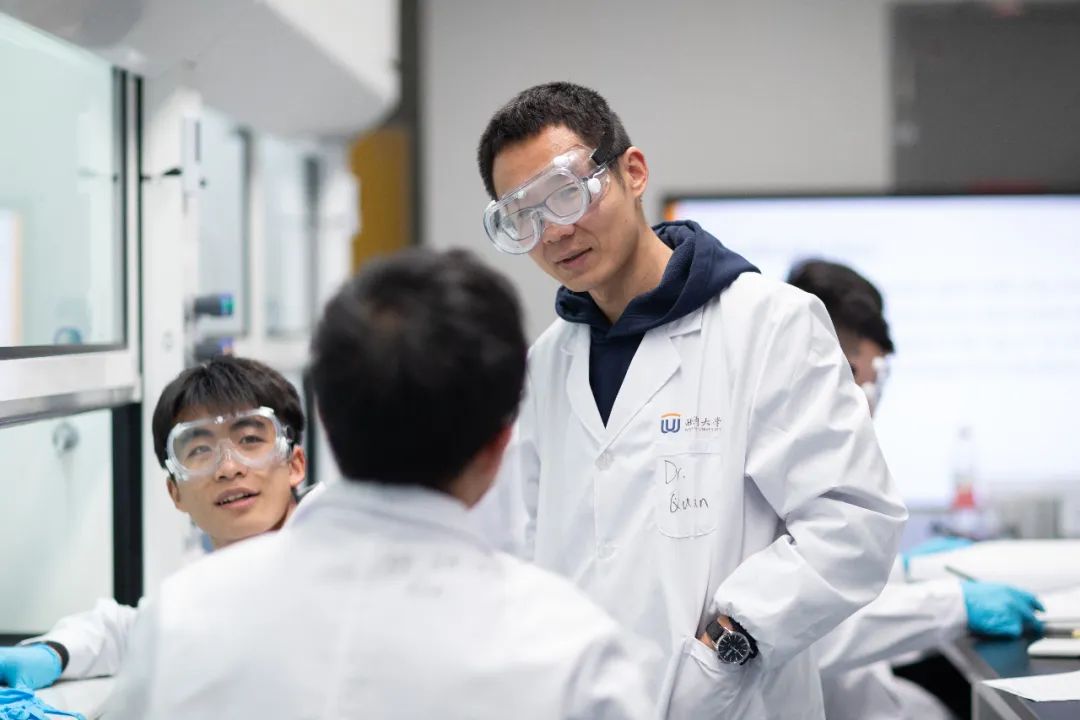




Search websites, locations, and people

Fostering Future Chemistry Leaders Through Student-Centered Learning: Q&A with Dr. Quan
Shirley Ji Wang
16, 2023
Email: sangeet@westlake.edu.cn
Phone: +86-(0)571-88112035
Office of the Dean, School of Science

Besides pursuing research at the cutting edge of chemistry, our faculty members at Westlake’s Department of Chemistry are deeply invested in cultivating academic excellence in our students and preparing them to become next-generation science leaders in their research fields. They employ an array of creative ways to educate our students so that they not only grasp difficult scientific concepts but also gain cognitive skills to become better learners and problem-solvers.
With over eight years of teaching experience, Dr. Xinfeng Quan is one such faculty member who brings a wealth of expertise to his role. As a lecturer in the Department of Chemistry, Dr. Quan teaches undergraduates and is regularly invited to give talks on teaching methods, higher-order thinking skills, and teaching efficacy. The School of Science’s staff correspondent Shirley Ji Wang recently interviewed him about his teaching approaches, as well as the Chemistry Department’s academic culture that fosters excellence.
Here is the full Q&A:
What inspired you to pursue a teaching career in chemistry?
I chose teaching as my career around the time when I received my Ph.D. in chemistry. I began to realize that I gain a strong sense of excitement and fulfillment from helping students learn, more so than from conducting research.
In your opinion, what are the most important skills or qualities that a successful chemist should possess, and how do you try to cultivate these in your students?
A chemist is a scientist who deals with chemical changes in matter. A successful chemist should be able to utilize scientific methods to discover new phenomena, develop theories, and solve complex problems. In addition to a deep understanding of key laws, experiments, and theories of chemistry, a successful chemist should possess great curiosity, passion, and methodology while exploring the material world. I try to design my courses to offer students the opportunity to explore and create knowledge themselves, which serves as training to help them explore the unknown in the future.
As a lecturer, you emphasize a student-centered approach to teaching. Why do you think it is essential in students' learning?
Student-centered education is an overarching educational philosophy that prioritizes the needs, interests, and abilities of individual students. This philosophy is supported by a series of evidence-based teaching methods that help students become more responsible, motivated, and effective learners and problem solvers. Specifically, these methods promote active engagement, individualized learning, higher-order thinking skills, autonomy, collaboration, intrinsic motivation, and metacognition. By adopting these methods, I aim to help my students develop the skills and habits essential to success in their academic, professional, and personal lives.
Could you illustrate your student-centered teaching approach?
I teach General Chemistry Lab 1 in the fall term and General Chemistry 2 in the spring at Westlake. In my lab course, students do not simply perform a series of operations following the manual. Instead, they must solve predesigned problems or even navigate "traps" to obtain meaningful results. For instance, in the experiment of gas laws, students may observe contradictory results after they follow seemingly simple experimental steps. They are then encouraged to analyze the cause of these unexpected findings.

In my theory course, Think-Pair-Share (TPS) is frequently used for students to think alone, discuss with their partners, and then share their thoughts with the class on a new concept or complex problem. To address epistemological and cognitive challenges students face while learning “by themselves”, I employ a novel model in lecture design called LHETAM (pronounced as “let’em”): “Laws, Hypotheses, Experiments, Theories, Applications, and Mathematics”. By categorizing information following this model, students are more likely to adopt a better strategy for information processing and effective learning.
One of the most successful outcomes I often observe from my students is that they find senior courses become easier, rather than more difficult, as they come to a better understanding of the essence of knowledge and develop stronger learning skills. I consider this as a significant accomplishment for the courses I have taught.
Why do you think the Department of Chemistry is an excellent place for students to study in? Tell us more about its academic culture.
I have received generous support from the Department of Chemistry as I implement and refine my teaching methods. I believe that such a free, open and supportive atmosphere is crucial for fostering academic excellence and innovation. The Department of Chemistry regards undergraduate teaching as one of its top priorities and devotes considerable talent and material resources to this endeavor. My colleagues and I are all dedicated to helping students become exceptional learners, problem-solvers, and creators.
RELATED
NEWS
Fostering Future Chemistry Leaders Through Student-Centered Learning: Q&A with Dr. Quan




















